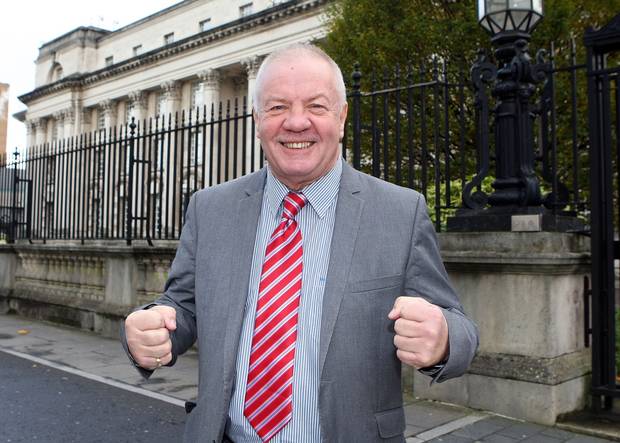Brexit challenge: Supreme Court to decide if UK needs Northern Ireland’s consent to leave EU
Posted By: November 18, 2016
A victims’ campaigner’s claim that the United Kingdom cannot quit the European Union without the consent of the people of Northern Ireland is to go before the Supreme Court.
Raymond McCord celebrated the Court of Appeal ruling. Picture by Freddie Parkinson/Press Eye
Senior judges in Belfast on Friday agreed to refer the contention at the center of Raymond McCord’s failed legal challenge to the Brexit process for further judicial consideration
in London.
Mr. McCord, whose son was murdered by loyalist paramilitaries, was jubilant at the outcome.
He said: “This has vindicated everything I have been trying to do. The people of Northern Ireland should be deciding whether we stay in the EU or leave – 56% of the people here voted to remain.”
His case will now advance to the Supreme Court alongside another unsuccessful legal bid to halt Brexit mounted by a cross-party group of MLAs.
Five issues of devolution are expected to come under scrutiny when those proceedings get underway next month.
Earlier this week, Northern Ireland’s Attorney General, John Larkin QC, referred the judicial review brought by Stormont politicians including Alliance MLA David Ford, SDLP leader Colum Eastwood, Sinn Fein Assemblyman John O’Dowd and Steven Agnew of the Green Party.
Mr. McCord’s lawyers sought permission to leapfrog the Court of Appeal and join them in putting their case before justices sitting in London.
The Belfast-based campaigner claims the Good Friday Agreement has given the Northern Irish public sole sovereignty to decide on their future.
His legal team predict that Brexit will cause constitutional upheaval and have a “catastrophic effect” on the peace process.
Nationalist aspirations to become part of the United Ireland and unionist desires to remain in the UK are both catered for in the Northern Ireland Act 1998.
The Supreme Court will now consider whether withdrawal from the EU without the consent of the Northern Ireland population impacts on those provisions.
“This is a major step forward for our people and for victims,” Mr. McCord said outside court.
“The three judges believe I have a right to an opinion, unlike political people who have criticized me.”
Prime Minister Theresa May is set to trigger Article 50 of the Lisbon Treaty, the formal process for confirming the UK is to leave, by the end of March 2017.
Even though the June 23 referendum backed Brexit, a 56% majority of voters in Northern Ireland wanted to remain.
Last month a High Court judge in Belfast dismissed separate proceedings issued by Mr. McCord and the Stormont politicians.
Mr. Justice Maguire rejected claims that the British Government cannot use royal prerogative powers to begin EU withdrawal without an Act of Parliament.
But earlier this month the High Court in London held that only Parliament can trigger Brexit.
With the Government set to challenge that ruling at the Supreme Court, lawyers in the Northern Ireland cases now have their own appeal routes mapped out.
During a court hearing last week counsel for the Government claimed any move to split the two cases could ultimately prove to be a “treacherous shortcut.”
Following the Attorney General’s direction an order was drawn up on Monday setting out four devolution issues for consideration by the Supreme Court in the MLAs’ case:
in the absence of compliance by the Northern Ireland Office with its equality obligations under that section?
Mr. McCord’s lawyers posed the same four questions, along with a fifth dealing with the requirement for the consent of the Northern Ireland public.
With a reference now made on that issue too, Supreme Court justices will consider the points along with the Government’s challenge to the verdict reached by the High Court in London. Speaking outside court, Mr. McCord’s solicitor, Ciaran O’Hare, explained their argument. “Essentially the question posed is whether or not there can be any Brexit for Northern Ireland, based on the fact we have our own constitution consisting of the Northern Ireland Act and the Good Friday Agreement.
“Section one of the Act secures the unionist ambition to remain part of the UK, but also gives the possibility of a united Ireland if the people were to vote for it.
“That’s why we have such an important legislative provision shouldn’t be undermined by Brexit.
“We say the people of Northern Ireland are sovereign on constitutional change.”










